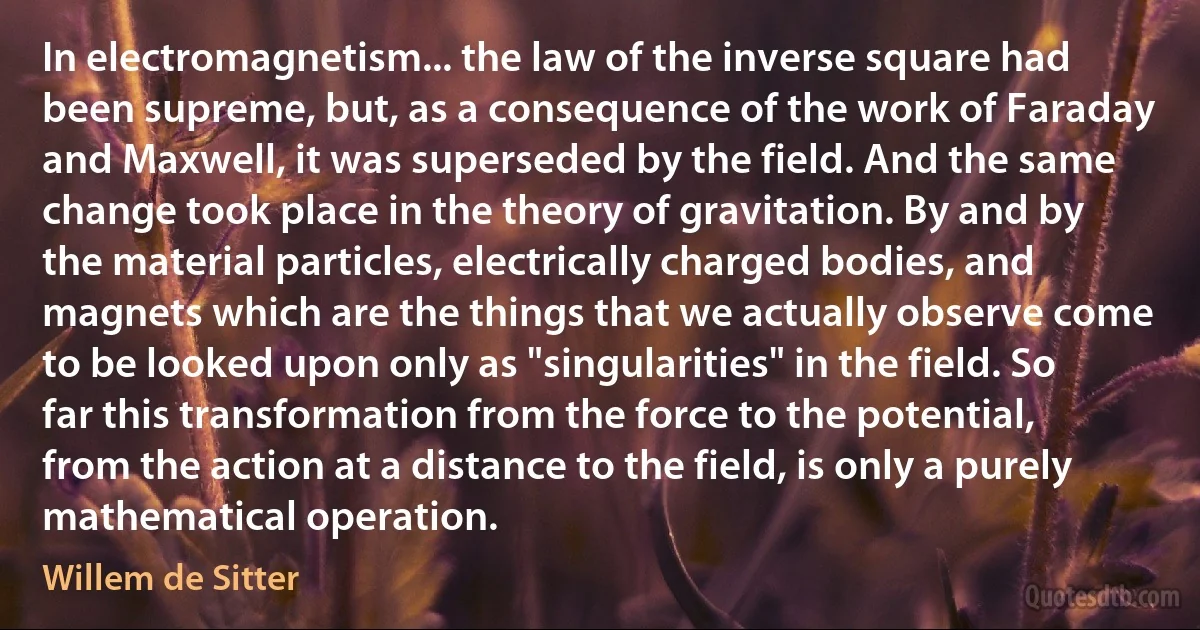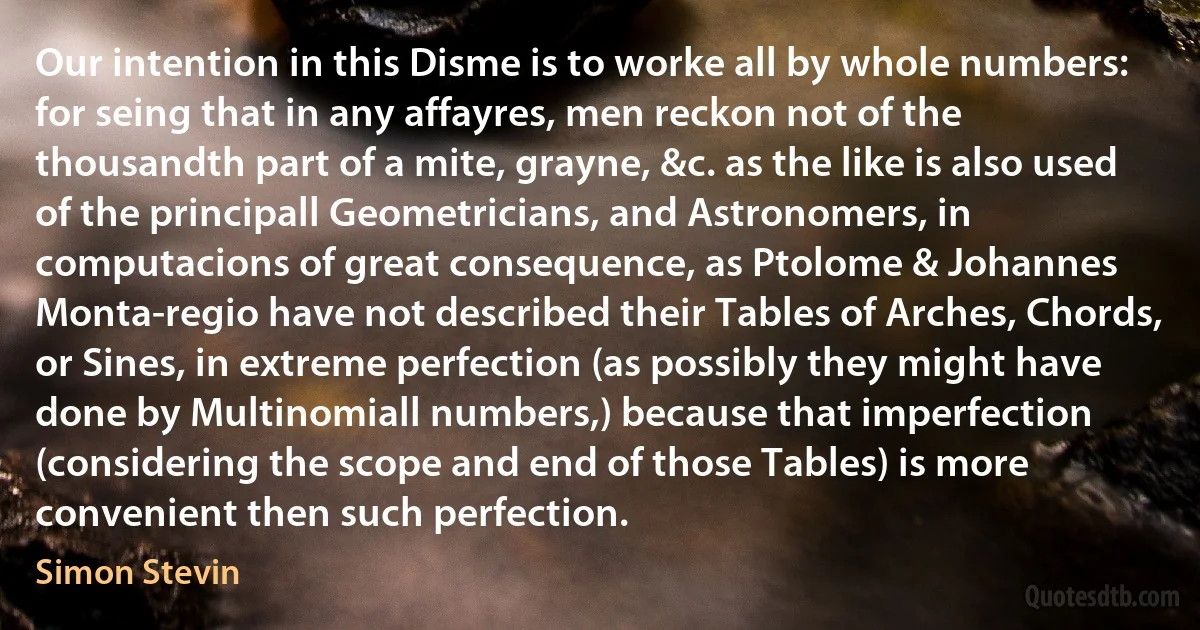Consequence Quotes - page 19
Nasiru-d din [Subuktigin] died in the year AH 387 (AD 997) and the command of his troops descended to Mahmud by inheritance, and by confirmation of Nuh, son of Mansur. His victory over 'Abdu-l Malik, when that chieftain was put to flight, added much to his power, and he was confirmed in the government of Khorasan and Sijistan, and he received a robe of honour with the title of Sultan from the Khalif, who also made a treaty with him. In consequence of the complaints of the oppression practised by the descendants of Fakhru-d din Dailami, he marched towards Júrjan and 'Irak, and took the country from them. Afterwards he turned his arms towards Hind, and conquered many of its cities and forts. He demolished the Hindu temples and gave prevalence to the Muhammadan faith. He ruled with great justice, and he stands unparalleled among all the Muhammadan kings.

Mahmud of Ghazni
The Sultan advanced to the fortifications of Kanauj, which consisted of seven distinct forts, washed by the Ganges which flowed under them like the ocean. In Kanauj there were nearly ten thousand temples, which the idolaters falsely and absurdly represented to have been founded by their ancestors two or three hundred thousand years ago. They worshipped and offered their vows and supplications to them in consequence of their great antiquity. Many of the inhabitants of the place fled and were scattered abroad like so many wretched widows and orphans, from the fear which oppressed them, in consequence of witnessing the fate of their deaf and dumb idols. Many of them thus effected their escape, and those who did not fly were put to death. The Sultan took all seven forts in one day, and gave his soldiers leave to plunder them and take prisoners.

Mahmud of Ghazni
It must be admitted that among a certain number of advanced mathematical physicists whose work has lain mainly in the twentieth century, the ether is regarded with suspicion, or even with contempt. And some of the opponents go so far as to as to say that the nineteenth century idea of the ether has failed to establish itself, and that in consequence the whole idea of the ether is under a cloud, and that it is only upheld by a few antiquated supporters, who, though are willing to admit many modifications in the original nineteenth century notions of an ether, feel the need of a medium capable of performing the functions attributed to it.

Oliver Lodge
But I venture to submit, my lord, that the consideration which the people of the Western countries receive in consequence of their voting power should be available to us, in matters of finance at any rate, through an "intelligent anticipation” – to use a phrase of Your Lordship's- of our reasonable wishes on the part of the government.

Gopal Krishna Gokhale
The analogy with bibliographic classifications and thesauri is obvious... despite the differences, it is to be regretted that 'ontological engineers' make little or no reference to work in information science. As a consequence, they do not appear to draw at all on the rich experience of constructing knowledge schedules ... or... developing concept lexicons.

Brian Campbell Vickery
What is it that has made of us in Germany the pivotal part? ... It is the avalanche-like increase of our supporters that gradually, with the certainty of a natural law, or more correctly of a natural force, grows from tens of thousands to hundreds of thousands, and from hundreds of thousands to millions, and is daily increasing, bidding defiance to our opponents and driving them into impotent rage. And this avalanche-like increase has come, and is coming, as a consequence of our opposition to and struggle with all other parties.

Wilhelm Liebknecht
Openness to the new is the virtue that describes the moral consequence of the doctrine of the relation of spirit to structure. The religion of the future inherits this doctrine from the struggle with the world, and radicalizes it. This virtue acts out the human truth of our relation to the settled contexts of our life and thought. That they are ephemeral and defective, that they cannot accommodate all the experience and insight we have reason to value, that there is always more in us, individually as well as collectively, than is, or ever can be, in them are facts giving us persistent reason to rebel against such structures.

Roberto Mangabeira Unger
We resolved to end our poison-enquiries by tasting the venomous liquor. According, having diluted a quantity of it, with a very little warm water, several of us ventured to put some of it upon the tip of our tongues. We all agreed, that it tasted very sharp and fiery, as if the tongue had been struck through with something scalding or burning. This sensation went off in two or three hours: and one gentleman, who would not be satisfied without trying a large drop undiluted, found his tongue swelled with a little inflammation and the soreness lasted two days. But neither his nor our boldness was attended with any ill consequence.

Richard Mead
An explanation of a phenomenon is regarded, apparently instinctively, as the most general possible when it is a mechanical explanation. The "mechanism" of the process is the ultimate goal of experiment. Now this mechanism in general lies beyond the range of the senses; either by reason of their limitations, as in the case of the atomic structure of matter, or by the very nature of the supposed mechanism, as in the theory of the ether. The only way to bridge the gap between the machinery of the physical process and the world of sense-impressions is to think out some consequence of that mechanism. This we will call the hypothesis. The hypothesis, resting still on the mechanical basis, is yet beyond the range of direct experimental investigation; but if, by mathematical reasoning, a consequence of the hypothesis can be deduced, this will often lie within the range of experimental inquiry, and thus a test of the soundness of the original mechanical conception may be instituted.

J. R. Partington
An immediate consequence of these principles of explanation is that the souls of organic beings, i. e., the compacts of mind-masses, arisen during life, continue to exist after death. (Their isolated persistence is not sufficient). But in order to explain the orderly development of organic nature in which the earlier collected experiences obviously serve as basis for the later creations, it is necessary to assume that these mind-masses enter into a greater compact of mind-masses, the Earth-Soul, and that these serve a higher soul-life according to the same laws as the mind-masses engendered in our nerve-processes observe in their service of our own soul-life.

Bernhard Riemann
I regard the whole of arithmetic as a necessary, or at least natural, consequence of the simplest arithmetic act, that of counting, and counting itself as nothing else than the successive creation of the infinite series of positive integers in which each individual is defined by the one immediately preceding; the simplest act is the passing from an already-formed individual to the consecutive new one to be formed. The chain of these numbers forms in itself an exceedingly useful instrument for the human mind; it presents an inexhaustible wealth of remarkable laws obtained by the introduction of the four fundamental operations of arithmetic.

Richard Dedekind
The essential parts of Christianity are the articles of faith by the denial or ignorance of which we cease to be Christians. The principal of these are: the spiritual deliverance through the suffering and death of Christ; Resurrection from death in confirmation of the sufficient suffering of Christ; and, the return of Christ for reward and punishment, as the fruit and consequence of the deliverance. He who grapples with or disproves these first principles attacks the substance (or essence) of the object.

Hermann Samuel Reimarus
The grand fauconnier of France was an officer of great eminence; his annual salary was four thousand florins; he was attended by fifty gentlemen, and fifty assistant falconers; he was allowed to keep three hundred hawks, he licensed every vender of hawks in France, and received a tax upon every bird sold in that kingdom, and even within the verge of the court; and the king never rode out upon any occasion of consequence without this officer attending upon him.

Joseph Strutt
I had yet to learn that no Bedu thinks it shameful to beg, and that often he will look at the gift which he has received and say, ‘Is this all that you are going to give me?' I was seeing the worst side of their character, and was disillusioned and resentful, and irritated by their assumption of superiority. In consequence I was assertive and unreasonable.

Wilfred Thesiger



